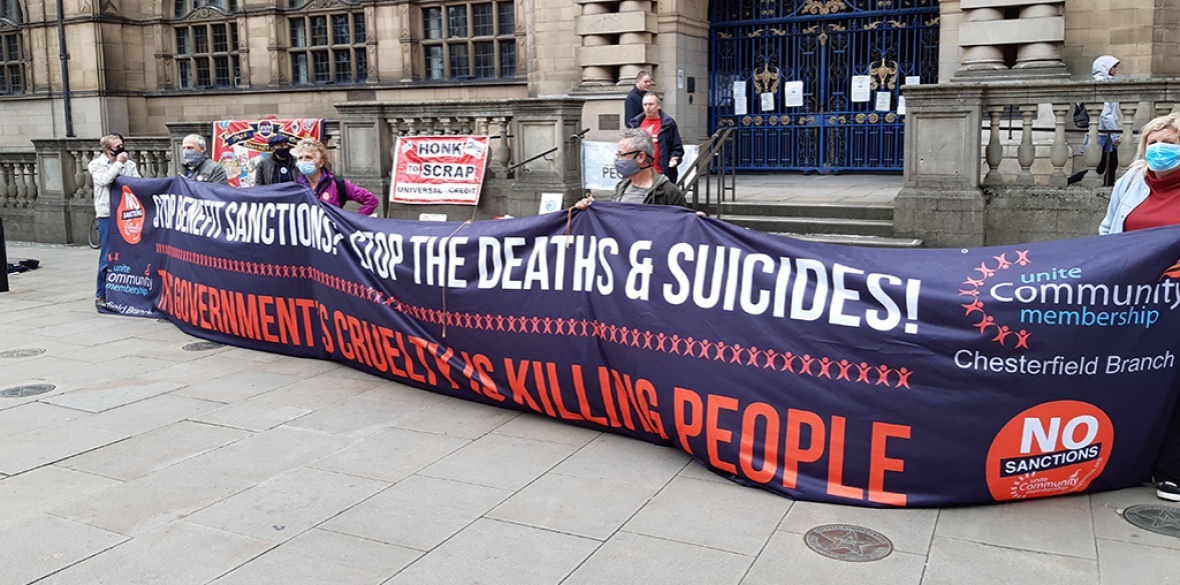UNITE COMMUNITY’S day of action over “universal discredit” focuses on three simple demands: to drop the five-week wait for payment, to make permanent the £20 top-up ministers agreed during the coronavirus crisis and to end benefit sanctions.
All three have justice on their side.
The #5 Weeks Too Long campaign pointing out that few families in Britain have sufficient savings to wait so long for their first benefit payment is backed by dozens of unions and NGOs: the TUC and Unison, homelessness charities like Shelter and CentrePoint, anti-poverty campaigns, foodbanks such as the Trussell Trust and many more.
The £20 top-up is a tacit admission by ministers that the level of universal credit is too low. With millions of new claimants as a result of lockdown and large-scale job losses, it became harder for the government to justify the punitively low levels of many benefits.
Even so, as organisations like Disabled People Against Cuts have pointed out, millions of benefit claimants who are not on universal credit but receive employment support allowance or other payments have been denied this vital raise.
And benefit sanctions have been one of the stand-out crimes of a decade of Tory-led “austerity.” Before Iain Duncan Smith was let loose on Britain’s social security system, it was inconceivable that people could be left to starve to death in a wealthy country such as ours.
Tragic cases such as those of David Clapson, Mark Wood and Errol Graham show how drastically our country has changed. Scores more have taken their own lives after having their incomes stopped.
Together with the horrendous suffering caused by the casually inaccurate fit-for-work tests forced on disabled people, the benefit sanctions regime helped complete the transformation of social security from a safety net to an obstacle course, a system designed to be humiliating and confusing to deter people from trying to access it.
For the left, the experience of lockdown must be used to challenge the poisonous ideology behind this. Tory attacks on welfare were justified by the age-old rhetoric about deserving and undeserving poor: strivers and shirkers.
Former chancellor George Osborne lamented the hard lot of the hard-working citizen going to work who looks up to see the curtains drawn at the house of his neighbour, “sleeping off a life on benefits,” while Nick Clegg tried (and failed) to coin a new classic of political terminology with his hymn to “alarm-clock Britain.”
Both painted an entirely inaccurate picture of those receiving social security as people too lazy to work, even as their government axed hundreds of thousands of jobs.
Both claimed that the new regime would “make work pay,” though the one thing they were not prepared to do toward that end was raise wages: instead they forced them down through years of pay freezes and below-inflation rises and presided over an explosion of insecure, minimum-wage work.
The next decade could be even more painful than the last. Unemployment is set to soar, with Britain’s biggest companies lining up to announce job losses by the thousand.
If millions of people have been forced onto the benefits system already, millions more will be when government job retention and self-employment support schemes end.
The jobs and welfare crises are two sides of the same coin. The labour movement needs to mount a huge campaign for jobs to “build back better” after the pandemic.
We need to use the new respect for “key workers” to demand better pay and better rights across the workforce. And we need to point to the sudden surge in joblessness to explode the myth of the “undeserving poor” and insist on a welfare system that protects working-class people from the vicissitudes of the market, and guarantees independence and dignity to those unable to work for health reasons.










